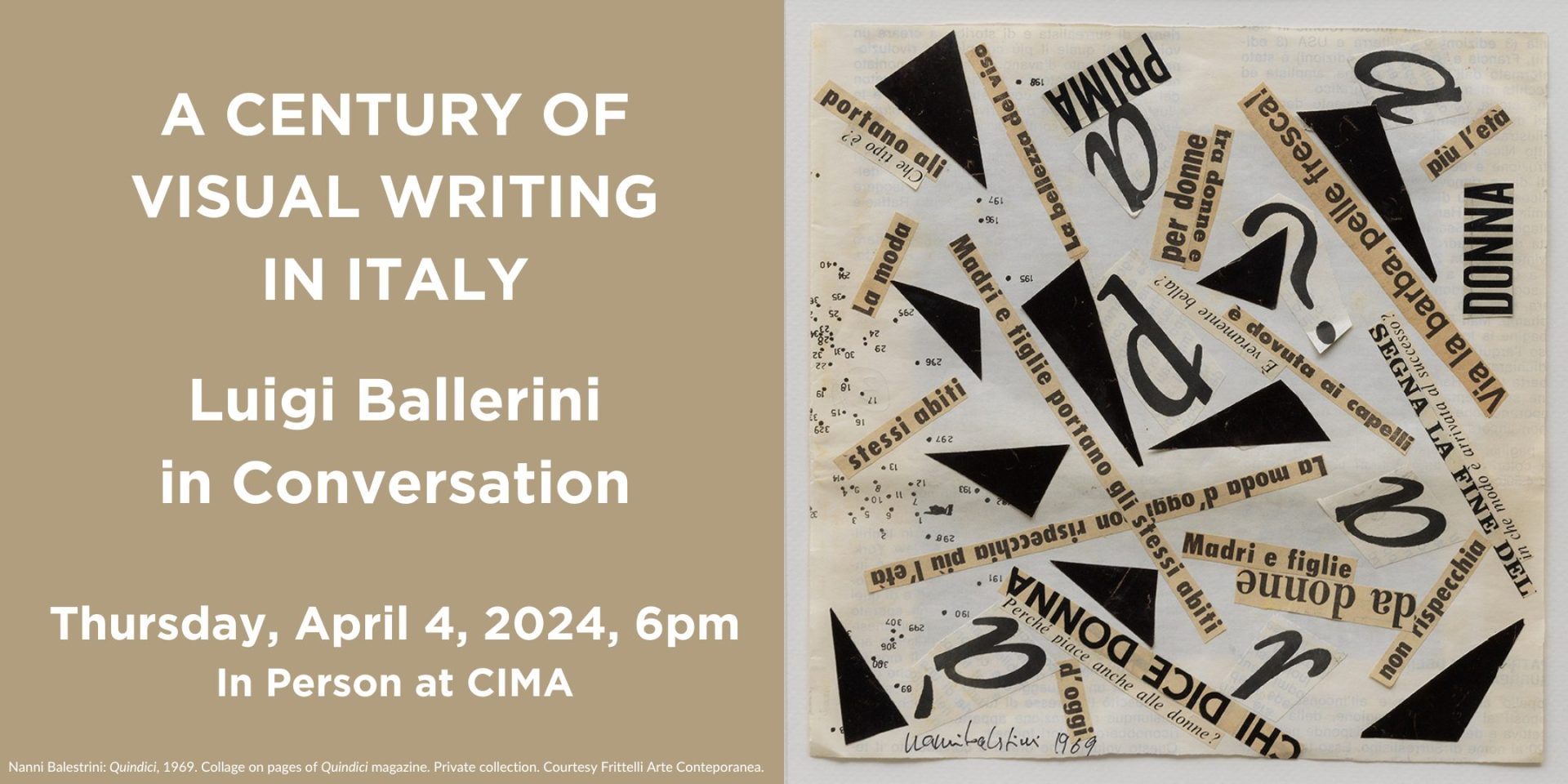A century of Visual Writing in Italy: Luigi Ballerini in Conversation
April 04, 2024, 6:00 PM

General Admission: $15, Members & Students: FREE
This conversation with leading Italian scholar and poet Luigi Ballerini is a unique opportunity to learn about the evolution, significance, and impact of visual writing in Italy as part of a global artistic movement. From the historical avant-gardes of the early twentieth century to the neo-avant-garde experimental practices in postwar Italy, Professor Ballerini will discuss the continuities and differences among these artistic expressions and the cross-pollination between visual arts and literature. The conversation between Prof. Ballerini and CIMA fellows Anna Szirmai and Francesca Zambon will explore the vast intercultural experiences that shaped the Italian art scene during and after the Years of Lead.
Luigi Ballerini (UCLA, Emeritus) is an Italian writer, poet, translator, and literary critic. Born in Milan, Professor Ballerini studied in Milan, London and Bologna. He taught at the Italian Department at the University of California, Los Angeles, at City College and the Graduate Center of the City University of New York, as well as at New York University, where he became the director of Italian Studies in 1976, and first director of the University’s Casa Italiana in 1990. He now lives between New York and Milan.
In 1963, Prof. Ballerini began working on the editorial staff of Rizzoli, sending to print the Italian translation of Foucault’s Madness and Civilization. In 1965, he moved to Rome, where he met neo-experimental artists and poets such as Adriano Spatola, Giulia Niccolai, Nanni Cagnone, Eliseo Mattiacci, Magdalo Mussio, Emilio Villa, Alfredo Giuliani, Giovanna Sandri and, in particular, Elio Pagliarani, with whom he became a collaborator.
Professor Ballerini moved to the United States in 1969, to teach Modern and Contemporary Italian Literature at University of California, Los Angeles. By 1971, he moved to New York, where he began teaching for the City University of New York and later for New York University. He returned to UCLA in 1992.
In New York, Prof. Ballerini has collaborated with both visual artists and poets. In 1973, he organized the exhibition Italian Visual Poetry from 1912 to 1972 at the Finch College Museum. In 1991, he organized the meeting of Italian and American poets The Disappearing Pheasant. His publications include major works in the field of literary criticism (La piramide capovolta, 4 per Pagliarani); translations (of, among others, Gertrude Stein, Lionel Abel, Leslie Fielder, Herman Melville, Benjamin Franklin, James Baldwin, Henry James, Charles Olson, Amiri Baraka); poetry collections, such as Il terzo gode (1994), Che figurato muore (1988), Shakespeherian rugs (1996), Uno monta la luna (2001), and Cefalonia ’43 (published by Mondadori in 2005 and awarded with the Brancati and Lorenzo Montano prize, and then reissued by Marsilio in 2013); the plaquette Uscita senza strada ovvero come sbrinare una bandiera rossa (2000), the book Se il tempo è matto (2010) and most recently the book of poems Divieto di sosta, published by Nino Aragno Editore in 2021.
Ballerini edited various works, including Marinetti’s Gli indomabili and Mafarka il futurista, and Melville’s Benito Cereno. He published the anthologies, Shearsmen of Sorts: Italian Poetry 1975-1993 (1992), The Promised Land (1999), and Those Who Look Like Flies from Afar (2013). His 1991 volume Che oror l’orient, a collection of bilingual poems in Italian and Milanese dialect, was awarded the Feronia Prize for poetry.
After collaborating with American publishing houses, in 2000 he founded Agincourt Press, which publishes experimental poetry, psychoanalysis, philosophy and literature. He is also known as a culinary historian, and since 2012 he has created the series of meetings “Latte e Linguaggio” (Milk and Language), which took place at the Chiesa Rossa public library in Milan. He is Founder and General Editor of the Lorenzo Da Ponte Italian Library, a series published by the University of Toronto Press.
Light refreshments will be offered
